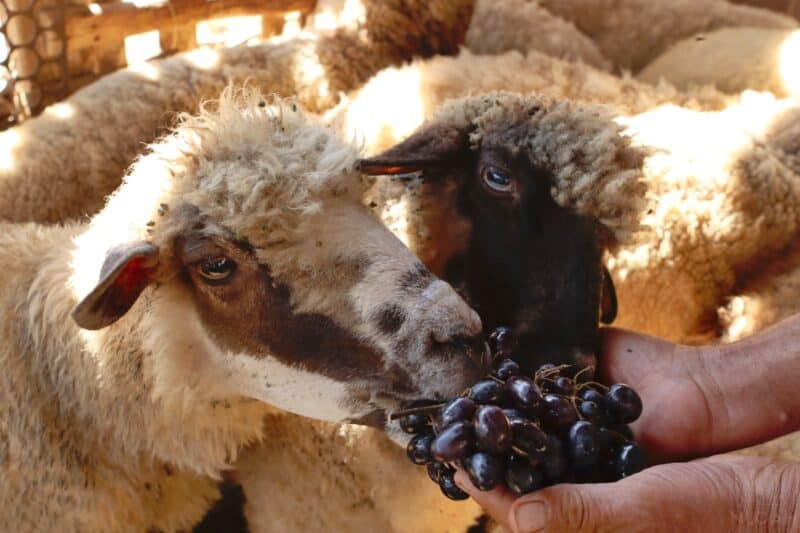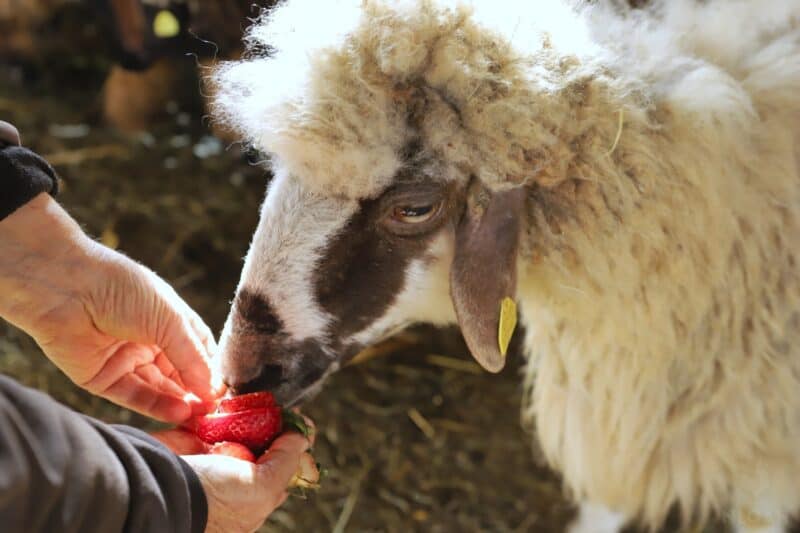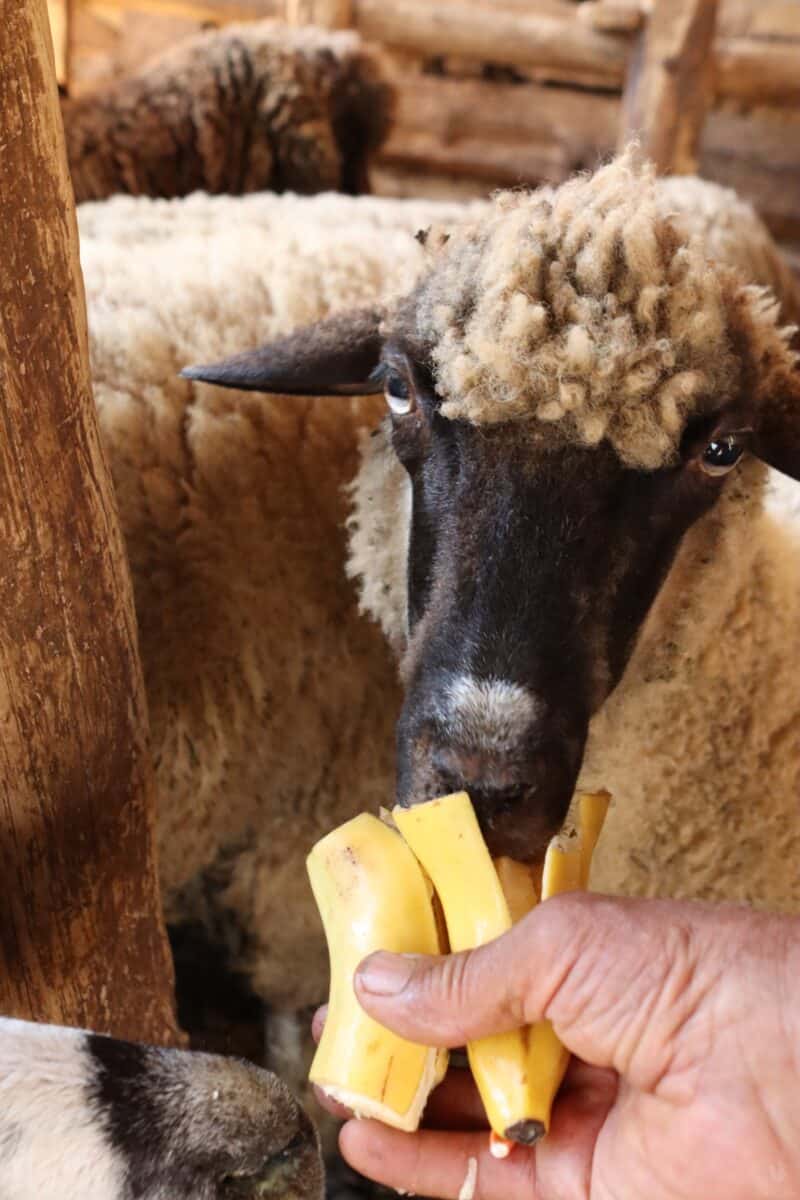If there’s one thing that most domestic animal species enjoy compared to their wild cousins, it is a diet of safety, security, and variety. Whereas a wild animal will have to eat what it can get, no matter how unpalatable it seems or how questionable its safety is, animals that are under the care of people tend to do much better.

This care even affects their menu choices, with many domestic animals enjoying foods that they would normally never get in the wild.
This certainly counts for our sheep, which rarely, if ever would have access to much fruit in nature. But that brings up a good question: can our sheep eat fruit safely?
Yes, most kinds of fruit are safe for sheep to eat but only in very limited quantities. The nutritious, many kinds of fruit tend to be way too sugary for our sheep to get regularly.
I can tell you this much: most sheep really enjoy fruit. And who can blame them? It’s so sweet and fragrant it’s undeniably appealing.
And considering that it is wholesome and generally healthy, this makes fruit the perfect treat to give them for good behavior or whenever you’re trying to incentivize.
But she can’t eat just any kind of fruit, and no matter what sort of fruit it is you can’t give them too much. Remember, it’s just a treat!
Keep reading and I’ll tell you everything you need to know about giving fruit to your flocks.
Do Sheep Like Fruit?
Yes, as a broad rule of thumb, they do. Sheep tend to enjoy all kinds of fruit, and usually the sweeter the better. But knowing this, you must be careful not to overdo it, either out of complacency or sentimentality!
Your animals will not restrain themselves if you give them a large quantity of fruit to eat, so it’s up to you to moderate those portions. As we will learn, too much can easily be bad for them.
How Nutritious is Fruit for Them?
The nutritional content of fruit varies hugely depending on what kind it is, but another rule of thumb that you can depend on is that all kinds of fruit will contain mostly carbohydrates in the form of sugars but also some fiber and very little in the way of fat or protein.
Most fruits have a decent assortment of vitamins and minerals to offer sheep, with the vast majority having one or two stand-out exemplars from each category and significantly less of the others.
Compared to vegetables, fruit can leave a lot to be desired in terms of nutrition but when you keep in mind that it is really only a treat or rare supplement to the usual diet of a sheep it is still a sweet that you can feel good about giving them.
How Can Fruit Benefit Sheep?
Fruit can be a good addition to a sheep’s diet as a source of quick energy, and as a reward or treat. For training sheep to come to you, fresh fruit is ideal. But fruits aren’t just tasty treats for your flock: all kinds can provide significant nutritional value as part of a well-rounded diet.
Broadly, it’s great for enhancing digestion thanks to good fiber content, and also improving metabolic and circulatory health.
But always remember that fruit should only be fed as a supplement, never the main course. Sheep will always need it in addition to their usual diet of forage, hay, grass, etc.
Can Fruit Hurt Sheep or Cause Health Problems for Them?
Yes, but this is really only likely if you feed them too much over time or all at once. The high sugar content of all fruits can upset a sheep’s digestive system leading to diarrhea or, sometimes, bloating.
Additionally, too much fruit in their diet can contribute to obesity and potentially dental problems, especially in the case of sweeter and more acidic types.
So, moderation is key if you want to treat your sheep with fruit. Like you would with any other new or novel food, make sure to gradually introduce any fruit into their diet and watch them for any negative changes in their behavior or physical condition.
Pesticides Can be a Major Problem on Store-Bought Fruit
One more important thing to keep in mind when feeding fruit to your sheep: the risk of pesticide exposure. Store-bought fruits are always- always- treated with pesticides, and even if washed, the ingestion of these chemical residues can prove harmful or potentially even fatal to sheep.
To avoid this risk, consider buying organic fruit or, better yet, feed them homegrown fruit that you grow yourself or get from a trusted source. In all cases, you should still always wash any picked fruit thoroughly before feeding it to your sheep.
Are Apples Fine for Sheep?
Yes, apples are safe and nutritious for sheep. However, they should avoid feeding apple cores (choking hazard) and apple seeds, the latter due to cyanide content.
Can Sheep Have Pears?
Yes, they can. Pears are a great treat for sheep. They’re packed with nutrients, but as with apples, remove the cores and seeds.
Can Sheep Eat Peaches?
Yes. Sheep can enjoy peaches as with most other fruits. Make sure to remove the pit as it is a serious choking hazard and also contains dangerous cyanide precursors.
Are Plums Safe for Sheep?
They are. Plums are safe for sheep to eat, just always remove the pits before feeding; again, they are a choking risk and also have dangerous compounds.
Are Citrus Fruits Okay for Sheep?
Citrus fruits are generally safe, but not a favorite among sheep and often not a good idea. The acidity of various citrus fruits can easily lead to serious stomach upset or a disastrous alteration of the pH balance in the rumen.
Can Sheep Eat Blueberries?
Yes, they sure can. Sheep can have blueberries and they love them! They’re also a good source of energy and packed with beneficial antioxidants. A great choice for training treats!

Can Sheep Have Strawberries?
Yes. Sheep can safely eat strawberries, too. They provide relatively few nutrients, but are tasty and a great teat. Sheep can eat the little green crown, also.
Are Raspberries and Blackberries Okay for Sheep?
Yep. Both raspberries and blackberries are safe for sheep. Both of these berries offer a juicy and nutritious treat, just don’t overdo it and expect some stained wool! And just in case you’re wondering, they can eat grapes too in moderation, with no issues.
Are Cherries Safe for Sheep?
Yes, cherries can be fed safely to your flock, but the pits must be removed to avoid choking hazards and their own toxicity.
Can Sheep Eat Figs?
Yes, figs are safe for sheep to consume. These floral fruits are a healthy, sweet, and highly fibrous treat. But they are dense and quite sugary, so go easy on the amount.
Are Watermelons Safe for Sheep to Eat?
Yes, watermelons are safe for sheep to eat. Incredibly juicy and hydrating, the rinds also provide a good source of fiber. Don’t overdo it; watermelon can easily cause diarrhea in large quantities.
Can Sheep Eat Cantaloupe Safely?
Yes. You might want to remove the seeds since they could possibly cause digestive issues.

Can Sheep Have Bananas?
Yes, they can! Bananas are a safe and tasty treat for your sheep. They’re a great source of energy and nutrients, but very high in sugar. You know the drill: mind the quantity!
Are Pineapples Alright for Sheep?
Yes. Pineapples are okay for sheep but only in very limited amounts. They are acidic and very sugary, so always introduce them slowly into their diet.
Are Kiwis Okay for Sheep to Eat?
Yes, kiwis are okay for sheep. Rich in many vitamins and minerals, they are a novel and nutritious treat when given in moderate amounts.
Don’t Give Your Sheep Spoiled or Moldy Fruit
Never give your flock bad fruit, of any kind. Spoiled or moldy fruit will contain harmful bacteria and potentially dangerous mold toxins that can lead to serious health issues, even death, in sheep. Only serve fresh, clean, and wholesome fruit for their consumption.
How Often Can Your Sheep Have Fruit?
Sparingly, no more than twice a week in small amounts as a rule. A good guideline is to give them no more than 2% to 5% of their total caloric intake in fruit once they are acclimatized to it.
While fruits are a great source of vitamins and minerals, they will only ever be treats rather than a main part of a sheep’s diet.
How Should You Prepare Fruit for Serving to Sheep?
Different fruits require different preparations, so make sure you check out our individual articles on them. But basically, you can ensure safety by first washing it thoroughly to remove any pesticides or dirt, and then remove rough skins and leaves and all pits or seeds.
Though some kinds are edible, others can pose a choking hazard or cause digestive upset. Always cut larger or strangely shaped fruits into more manageable bite-size pieces and serve.
Is Fruit Safe for Lambs to Eat?
Yes, generally. Fruits should be introduced to lambs only once they start eating solid food. Be sure to start them on very, very small quantities initially and watch out for diarrhea and loss of appetite: if you see either, stop giving them fruit.
I’ve taken over this blog from Kendra Lynne around 2018, and turned it into one of the best an most comprehensive homesteading website out there. I was raised partly in the countryside living a very frugal life ever since I can remember.
